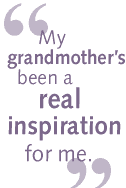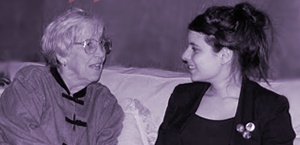 |
Baylor University’s Institute for Oral History offers
an on-line workshop for gathering oral histories. The site also
contains information on technical equipment to use, ethical and
legal considerations, and what to do with the histories once gathered. Canadian Oral History Association publishes the Forum,
an annual review containing a selection of papers on oral history
in Canada. The Forum and this Web site disseminate information
on all aspects of oral history and endeavors to stimulate quality
research as well as to encourage high standards for the creation,
preservation, and use of oral history documents. Center for Digital Storytelling is a non-profit project
development, training, and research organization dedicated to assisting
people in using digital media to tell meaningful stories from their
lives. They also offer workshops for organizations and individuals,
and provide a clearinghouse of information about resources on storytelling
and new media. East Midlands Oral History Archives produces a series of
information sheets for people interested in getting started in oral
history. History Matters is designed for high school and college
teachers of U.S. History survey courses, this site serves as a gateway
to Web resources and offers unique teaching materials, first-person
primary documents, and threaded discussions on teaching U.S. history. H-Oralhist is a network for scholars and professionals active
in studies related to oral history. This is a good way to be in
communication with others involved in oral history work. Library of Congress Learning Page was created to assist
educators as they use the American Memory Web site to teach about
United States history and culture. The site provides tips and tricks
for using the American Memory collections, as well as frameworks,
activities, and lessons that provide context for their use. One Minute Guide to Oral Histories offers a bullet pointed
list of oral history interview techniques. Oral History Association seeks to bring together all persons
interested in oral history as a way of collecting human memories.
The OHA provides both professional guidance and a collegial environment
for sharing information. Oral History Society – United Kingdom is
an international organization dedicated to the collection and preservation
of oral history. It encourages people of all ages to tape, video,
or write down their own and other people's life stories. It also
offers practical support and advice about how to get started, what
equipment to use, what techniques are best, how to look after tapes,
and how to make use of what you have collected. Oral History Techniques: How to Organize and Conduct Oral History
Interviews was compiled by Dr. Barbara Truesdell, Assistant
Director at the Indiana University Oral History Research Center.
The on-line pamphlet available on this site is a helpful organizational
tool. The Regional History Project at the University of California,
Santa Cruz Library has an excellent oral history primer that
contains useful information on collecting oral histories. Rocky Gap High School Oral History and Technology Project is
a unique blend of tradition and technology. Technology is the lure
to bring students to their community history through the stories
of its citizens. However it is these stories that give content for
the technology to organize, manipulate, and publish. The process
gives a student sense of place and thus of himself. The purpose
of the site is to help teachers or community members initiate similar
projects. |
||
 |
|||